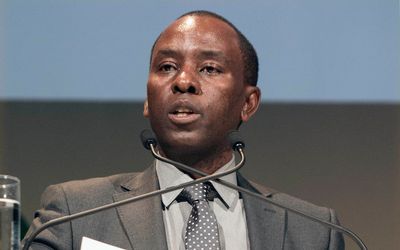THE mining industry’s leaders meet and mingle at this week’s Mining Indaba, with a commodities crisis looming large over the gathering.
It’s therefore worth reflecting on the employment trends that the World Bank’s recent SA economic update highlighted. We may think that the 143,000 job losses in mining in the past five years is a savage toll, but the bank seems to suggest that worse is still to come.
"Job losses in SA mining have been relatively small so far," says the report, which shows that mining employment in SA is down just 2% off its peak in 2014. By contrast, job numbers in Australian mining, which peaked in 2011, have fallen 18% and Chile’s 10%.
SA’s record, far from being a cause for self-congratulation, should prompt deep concern — because it signals that the worst is far from over, and suggests that SA has not come to terms with what the end of the commodities supercycle means.
Commodity prices have plummeted, with the worst of these — iron ore — down 80% from its peak in 2011. And no one expects them to pick up anytime soon. Indeed, most expect further weakness. Some companies face closure.
Amid all this, Mineral Resources Minister Mosebenzi Zwane’s keynote address on Monday was underwhelming.
He focused not on the need to save SA’s mining industry, but narrowly on the need to save jobs without tackling some of the tougher choices the sector faces.
He clearly gets it that the commodities cycle is not on the upturn, but while his description of the industry as being in its "winter season" was a nice turn of phrase, it indicated, perhaps, that Mr Zwane hasn’t appreciated quite how much the world has changed. This is not just a seasonal downturn, but a crisis in which the survival of much of the industry is at risk.
That perhaps is why he asked on Monday "what lessons can be learnt to ensure that as we move into the next season, our workers don’t remain the ones worst affected by the winter".
Of course, jobs are crucial and the losses that have already occurred are tragic. But the global commodities cycle is not going to turn until a lot more capacity is taken out of the market. That means more production shutting down in SA and further restructuring to reposition the industry for a future in which China’s economy has slowed down and the supercycle has ended.
The trouble with the government’s focus on jobs and regulation is that it does not acknowledge the existential crisis faced by many miners. That makes it very difficult for restructuring to take place in a timely or optimal manner. And the delay means the consequences will be worse for everyone.
Mr Zwane was credited with ticking the right boxes and making the right noises, and his speech did recognise the industry’s need for regulatory certainty, political stability and a stable labour market.
That’s a start. But SA’s beleaguered miners need more than promises.
What investors and industry players were looking for was the detail on how he saw major disputes could be solved — on the ownership clause in the Mining Charter and aspects of the Mineral and Petroleum Resources Development Act.
Mr Zwane needed to also offer creative suggestions on how to facilitate and expedite the restructuring the industry urgently needs so that it is prepared for the next upturn, even if it’s in the distant future.
Regulatory hurdles and political pressure hamper the restructuring. They also risk greater damage to the social and economic fabric of SA and make it likely that when the cycle finally turns, SA will not be ready to benefit.
Mr Zwane said some of the right things about sorting out the regulatory mess. But he said little about making SA a competitive destination for investment. That omission was unfortunate.

Mineral Resources Minister Mosebenzi Zwane delivers the opening address at the Mining Indaba in Cape Town on Monday. Picture: TREVOR SAMSON
THE mining industry’s leaders meet and mingle at this week’s Mining Indaba, with a commodities crisis looming large over the gathering.
It’s therefore worth reflecting on the employment trends that the World Bank’s recent SA economic update highlighted. We may think that the 143,000 job losses in mining in the past five years is a savage toll, but the bank seems to suggest that worse is still to come.
"Job losses in SA mining have been relatively small so far," says the report, which shows that mining employment in SA is down just 2% off its peak in 2014. By contrast, job numbers in Australian mining, which peaked in 2011, have fallen 18% and Chile’s 10%.
SA’s record, far from being a cause for self-congratulation, should prompt deep concern — because it signals that the worst is far from over, and suggests that SA has not come to terms with what the end of the commodities supercycle means.
Commodity prices have plummeted, with the worst of these — iron ore — down 80% from its peak in 2011. And no one expects them to pick up anytime soon. Indeed, most expect further weakness. Some companies face closure.
Amid all this, Mineral Resources Minister Mosebenzi Zwane’s keynote address on Monday was underwhelming.
He focused not on the need to save SA’s mining industry, but narrowly on the need to save jobs without tackling some of the tougher choices the sector faces.
He clearly gets it that the commodities cycle is not on the upturn, but while his description of the industry as being in its "winter season" was a nice turn of phrase, it indicated, perhaps, that Mr Zwane hasn’t appreciated quite how much the world has changed. This is not just a seasonal downturn, but a crisis in which the survival of much of the industry is at risk.
That perhaps is why he asked on Monday "what lessons can be learnt to ensure that as we move into the next season, our workers don’t remain the ones worst affected by the winter".
Of course, jobs are crucial and the losses that have already occurred are tragic. But the global commodities cycle is not going to turn until a lot more capacity is taken out of the market. That means more production shutting down in SA and further restructuring to reposition the industry for a future in which China’s economy has slowed down and the supercycle has ended.
The trouble with the government’s focus on jobs and regulation is that it does not acknowledge the existential crisis faced by many miners. That makes it very difficult for restructuring to take place in a timely or optimal manner. And the delay means the consequences will be worse for everyone.
Mr Zwane was credited with ticking the right boxes and making the right noises, and his speech did recognise the industry’s need for regulatory certainty, political stability and a stable labour market.
That’s a start. But SA’s beleaguered miners need more than promises.
What investors and industry players were looking for was the detail on how he saw major disputes could be solved — on the ownership clause in the Mining Charter and aspects of the Mineral and Petroleum Resources Development Act.
Mr Zwane needed to also offer creative suggestions on how to facilitate and expedite the restructuring the industry urgently needs so that it is prepared for the next upturn, even if it’s in the distant future.
Regulatory hurdles and political pressure hamper the restructuring. They also risk greater damage to the social and economic fabric of SA and make it likely that when the cycle finally turns, SA will not be ready to benefit.
Mr Zwane said some of the right things about sorting out the regulatory mess. But he said little about making SA a competitive destination for investment. That omission was unfortunate.




















Change: -0.47%
Change: -0.57%
Change: -1.76%
Change: -0.34%
Change: 0.02%
Data supplied by Profile Data
Change: -1.49%
Change: -0.01%
Change: -0.47%
Change: 0.00%
Change: -0.08%
Data supplied by Profile Data
Change: 0.61%
Change: 0.85%
Change: 0.20%
Change: -0.22%
Change: 0.93%
Data supplied by Profile Data
Change: 0.29%
Change: -0.32%
Change: 0.13%
Change: -1.40%
Change: -1.88%
Data supplied by Profile Data